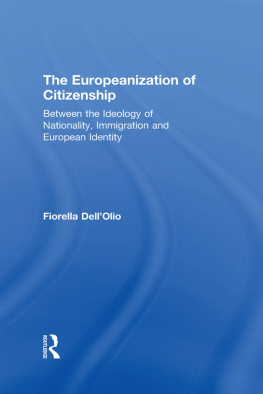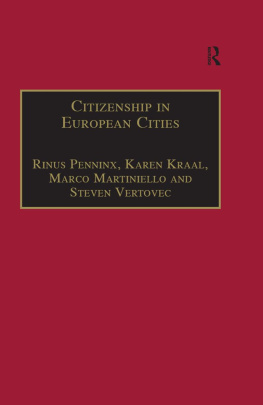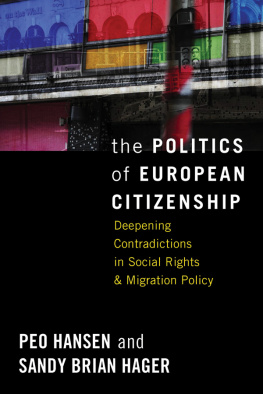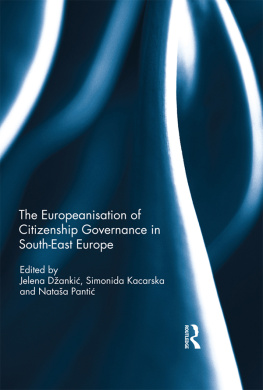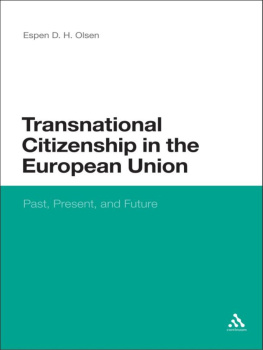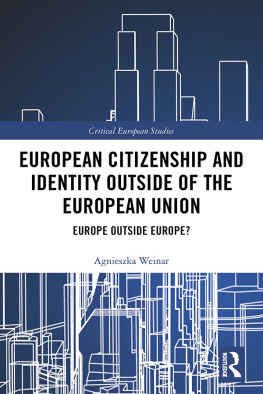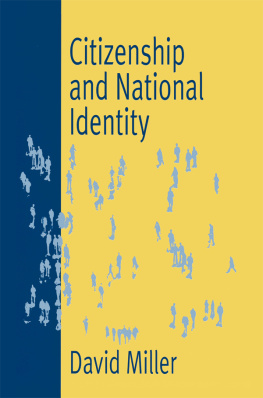THE EUROPEANIZATION OF CITIZENSHIP
To Ilena and Bill
The Europeanization of Citizenship
Between the Ideology of Nationality, Immigration and European Identity
FIORELLA DELLOLIO
University of Cambridge, UK
First published 2005 by Ashgate Publishing
Published 2016 by Routledge
2 Park Square, Milton Park, Abingdon, Oxon OX14 4RN
711 Third Avenue, New York, NY 10017, USA
Routledge is an imprint of the Taylor & Francis Group, an informa business
Copyright 2005 Fiorella DellOlio
Fiorella DellOlio has asserted her right under the Copyright, Designs and Patents Act, 1988, to be identified as the author of this work.
All rights reserved. No part of this book may be reprinted or reproduced or utilised in any form or by any electronic, mechanical, or other means, now known or hereafter invented, including photocopying and recording, or in any information storage or retrieval system, without permission in writing from the publishers.
Notice:
Product or corporate names may be trademarks or registered trademarks, and are used only for identification and explanation without intent to infringe.
British Library Cataloguing in Publication Data
DellOlio, Fiorella
The Europeanization of citizenship : between the ideology
of nationality, immigration and European identity
1. European Union 2. Citizenship European Union countries
3. Citizenship - Europe 4. Political rights - European Union
countries 5. Political rights - Europe 6. Nationalism
European union countries 7. Nationalism - Europe 8. National
characteristics, European 9. European Union countries - Emigration and immigration
I. Title
323.6094
Library of Congress Cataloging-in-Publication Data
DellOlio, Fiorella, 1966
The Europeanization of citizenship : between the ideology of nationality, immigration and European identity / by Fiorella DellOlio.
p. cm.
Includes bibliographical references and index.
ISBN 0-7546-3595-3
1. Citizenship--European Union countries. 2. Citizenship--Europe. 3. Political rights--European Union countries. 4. Political rights--Europe. 5. Nationalism--European Union countries. 6. Nationalism--Europe. 7. National characteristics, European. 8. European Union countries--Emigration and immigration. 9. European Union. I. Title.
JN40.D443 2004
323.6094--dc22
2004020208
ISBN 9780754635956 (hbk)
Typeset in Times Roman by N2productions
Contents
This book has grown out of my earlier research on, The significance of the European Union for the evolution of citizenship and immigration policies: the cases of the United Kingdom and Italy, (London School of Economics and Political Science, University of London, 2001). An award from the Universit degli Studi di Bari in 1993 enabled me to pursue a year of research at the LSE. A further grant from the Centro Nazionale di Ricerca (CNR) in Rome allowed me to continue my research at the LSE. I am much obliged to Professor Eligio Resta who encouraged me to go abroad for my postgraduate work. I would also like to thank Professor Franco Chiarello, who gave me the opportunity to gain valuable research experience after I had completed my undergraduate work and later supported my grant application to the CNR.
In the spring 1996, as a postgraduate student, I received a grant from the European University Institute in San Domenico di Fiesole just outside Florence, which afforded me the opportunity to work there for four months and to attend the European Forum on Citizenship. This gave me the chance to discuss some aspects of my work with experienced scholars. I would like to thank in particular Professor Christian Joppke, who was then at the Institute, for his time.
My greatest debt is to Dr Chris Husbands of the London School of Economics and Political Science, who has given me much valuable advice and encouragement. I also wish to thank Ms Amani Siyam, who kindly assisted me in some of the statistical procedures used in this book, and Professor Erika Szysczak, who read and commented upon some legal aspects of my work. Professors Elizabeth Meehan and Rodney Barker have also read and commented on my work, and their suggestions have helped me to put forward my arguments with greater clarity and focus.
I would also like to express my extreme gratitude to my parents, who gave me their constant support, and to my husband, William R. Day, who has read the entire text in one form or another and has helped me to refine my thoughts and express myself more clearly in a language that is not my own.
Some parts of this book have appeared previously in articles in Politics, Journal of European Public Policy, Journal of Ethnic and Migration Studies and in A. Arnull and D. Wincott (eds), Accountability and Legitimacy in the European Union (Oxford 2002). Some of them have been substantially reworked in this book while others have merely been brought up to date. I have specifically identified these parts of the text, along with the place of their original publication, in the footnotes.
Cambridge, 2005
BNA British Nationality Act
Bull. EC Bulletin of the European Community
EC European Community
EC Treaty Treaty Establishing the European Community
ECHR European Convention of Human Rights
ECJ European Court of Justice
EEC European Economic Community
EP European Parliament
EU European Union
IGC Intergovernmental Conference
IT Italy
JHA Justice and Home Affairs
OJ Official Journal
TEU Treaty on European Union
UK United Kingdom
The book analyses the link that the establishment of European citizenship creates between citizenship, nationality and immigration policies. European citizenship not only reinforces the link between citizenship and nationality at the national level, but it also creates a new link between citizenship practices and immigration policies at both the national and European level.
The idea of a common citizenship across all the EU member-states, which could eventually serve as the basis for a European identity, legitimises privileged access to rights to which not all individuals legally residing in the EU are entitled. One of the recurring questions surrounding the issue of citizenship is why Europeans need a supra-national citizenship in addition to their national one. Although in practical terms European citizenship has proved to be of little significance, it has had some political and normative implications. The focus on nationality as the primary criterion to determine eligibility for European citizenship has two consequences. The first concerns the national level in which the enhancement of nationality functions towards the redefinition of national immigration policies. The second concerns the EU level in which a binary typology of us and them takes place.
The focus on nationality does not necessarily challenge the forging of a European identity. National and European identity can indeed be compatible, but the focus on nationality makes it difficult to conceive citizenship at the post-national level in a way different from the national one. Citizenship at the nation-state level undoubtedly represents not only a legal means for the access to civil, political, and social rights, but it also usually conflates with the idea of the nation-state in terms of belonging and cultural identity. What ought to distinguish a post-national citizenship is instead the rupture between citizenship conceived in terms of rights and citizenship considered in terms of national and/or cultural traits.

